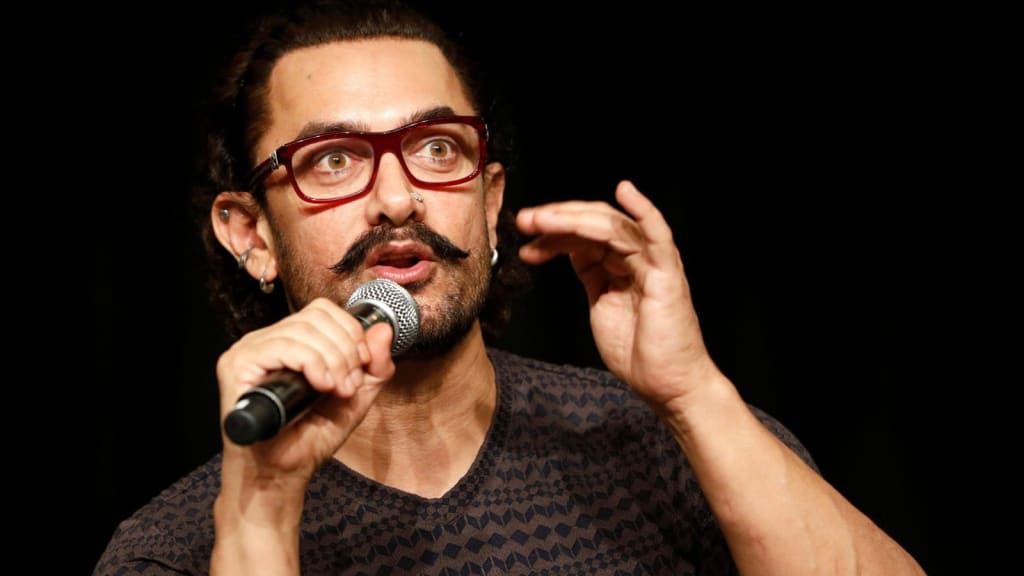One of the world’s most successful actors believes in crying long and hard over his failures
To many, Bollywood actor Aamir Khan is the face of success. The 53-year-old shot to fame in India after he appeared in a Romeo-and-Juliet-like romance three decades ago.

After a decade of movies, few as commercially successful as that one, Khan began producing and starring in his own films—and his career really took off, starting with the 2001 smash hit Lagaan, about a group of villagers who go up against their British colonial rulers in a game of cricket.
Now his movies, which often portray the struggles of India’s middle-class young people—from the intense psychological pressure of university to the deep-seated sexism that women with big or small dreams have to battle—have become increasingly popular outside of India as well. Last year’s Dangal, based on the story of an Indian wrestling champion who trained two of his daughters to become world-class wrestlers, spent several weeks at the top of the box office in China, a market where Hollywood usually rules the box office.
Yet when young people meet Khan, they often ask him to speak to their fears of failing. In Hong Kong this week, after the weekend opening of his newest film, Secret Superstar, about a young woman who defies her conservative father to become a YouTube sensation, Khan offered his tips for how to succeed—and also how to fail—prompted by questions from the audience of University of Hong Kong students.
Like this one: If you could ever be 18 or 19 years old again, what’s that one piece of advice that you’d give yourself?
His most important advice, Khan said, is to “never compromise.” He first learned that when he told his parents that he wanted to opt out college, viewed as a must by high-achieving Asian families, and go into the movie industry. The response from his family and friends, he said, was, “Are you nuts?” But Khan said he kept persuading them that being out of formal education was not the end of education; in fact, he had every intention of educating himself in his own way.
It was a lesson he learned again in the uncertain years after his first big hit movie.
And suddenly I was an overnight star and then I began working in a number of films. Too many actually. And some of them were not very good. These second and third films were not doing well and they were not really good films. And I was labeled a one-film wonder by the media and rightly so…I was at the worst in my career. I could see my career ending. And I was so unhappy with the work I was doing. And I was so disturbed and I used to cry and actually weep…Since I’ve committed to these films I had to complete them and I know they were not good films but I still had to complete them. You know it’s a hard situation to be in.
And at that time I swore to myself that never again will I ever do a film if I am not happy. I have to love this script, I have to have complete faith in the director and I have to have complete faith in the producer because these three chains really determine what the film turns out.
Thinking about what really mattered to him gave Khan the courage to turn down an offer from a “hotshot” director who approached him at the time he was desperately looking for a chance to revive his career. “He’s the one person who is going to pull me out of this quicksand,” Khan remembered thinking at the time. But Khan didn’t like the script and he ended up walking away from the opportunity, a decision that may have paved the way for his later success. “If I had compromised on that day, the rest of my career would be a series of compromises,” he said. “When I was at my worst, when my back was against the wall… at that weakest moment because I had the strength to hold on to my dreams and not compromise, my career went somewhere else.”
Of course, there are always failures. Khan’s second rule is to face them, deeply mourn them, and thank them for making you stronger:
The maximum that I learned in my life was when I failed… I believe in mourning your losses, like when my film doesn’t work I like really weep, you know this is the end of the world. But then it’s important to mourn the loss and get it out of your system. And then you pick yourself up and then you try to understand, ‘Why did it happen?’ And then you will discover what went wrong and learn from that. And your failures should make you stronger and bigger is what I believe.
Khan’s last piece of advice: Success is more dangerous than failure. Because it can go to your head.
Very few people can handle success. Success is something you have to really careful in handling. You have to understand that your success, especially in films, that your success is a result of a lot of people coming together and making something. So when people look at me and say, ‘Hey you’ve done some very wonderful films,’ what I tell them is… there are so many people who have come together to make the film and you have liked it because of the collective contribution of all of us.
Are you a top company for remote workers? Whether you’re fully remote or distributed with a strong remote contingent, you may be eligible for Quartz’s Best Companies for Remote Workers, a new, global ranking to be published later this year on Quartz at Work. Registration is free. Click here to apply.





Comments
There are no comments for this story
Be the first to respond and start the conversation.